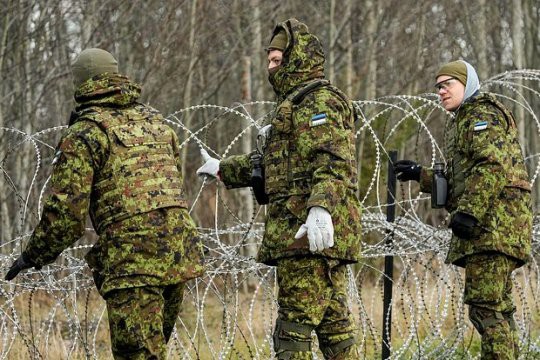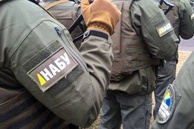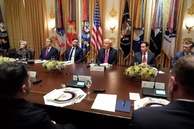Since the onset of September, panicked and bravura statements coming out from the Baltic capitals have been taking turns demonstrating the scope of emotional swings. This time round, we are talking about strategic confusion caused by contradictory signals from Washington. On the one hand, President Trump made it clear that he intends to maintain (or even increase) the US military presence in Poland, and in his bicentennial anniversary decree signed on September 5, he also changed the name of the Department of Defense to the "Department of War," reviving a name that it used to assume from 1789 until 1947. According to the decree, the renaming “will sharpen the focus of this Department on our national interest and signal to adversaries America's readiness to wage war to secure its interests." On the other hand, according to The Financial Times, the US intends to curtail the military aid program for European countries bordering on Russia.
The program, known as Section 333, sees the Pentagon train and equip allied troops around the world. In Europe, the main recipients of this aid have been Estonia, Latvia and Lithuania. The extent to which the project affects other countries along Russia’s western border (Norway, Finland and Poland) is not specified. According to the newspaper, Pentagon representatives informed European diplomats about the cutoff in funding in late August. The Europeans were “stunned” by the news, the FT added, citing its sources. Military and political officials are now trying to understand whether this will affect critical elements of European security. [i]
From 2018 to 2022, the United States has reportedly spent $1.6 billion on supporting its European partners under this program, which amounted to about 29 percent of the world's total expenditure under Section 333. The funds for this secret program are approved by Congress. They are currently allocated until September 2026, and the White House does not plan to request new funds.
This means that President Trump’s oft-repeated public statements that European countries need to spend more on their own security without relying on Washington become a reality. Despite earlier harbingers of change, this alarming message from the US media came as an unpleasant surprise for Lithuania’s Defense Ministry, which said in a statement that Vilnius does not yet have official information and is ready to inquire with the US side via military-diplomatic channels.
The ministry’s representative, Vaidotas Urbelis, said that Lithuania had not received official information regarding the reduction of US military assistance. He did acknowledge, however, that Washington had informed European countries the day before “that starting from the next fiscal year, this line (section 333) will be reset to zero for all European countries.”
“There is no information on paper. There are conversations, certain signs, statements that we see the overall picture,” said Urbelis, somewhat evasively. “We are talking with Defense Department employees, looking at the available options to see which programs will be continued, and which will be postponed, and which path we will take.” He is echoed by Lithuanian Deputy Foreign Minister Audra Plepyte: “At this stage, these are more talk and rumors.” [ii].
The Lithuanians, Latvians and Estonians will clearly have to make do without some of the former US aid, and cover some of the expenses themselves and by using NATO "grants." We are talking about annual outlays of about $100 million for each Baltic country. At the same time, Urbelis made it clear that "far from all is gone now," since Lithuania cooperates with the United States and is getting assistance provided as part of other programs, while the reduction "will definitely not affect" the US military presence in the country. There are nearly 2,000 American troops currently stationed in the Baltic countries as part of the military potential buildup. While worried as they are, the Lithuanians are still hopeful about America’s symbolic military presence on NATO’s eastern flank, Estonian President Alar Karis grimly told Politico on September 4 that European countries bordering Russia should be ready to make up for the reduction of US troop numbers in the region by increasing their own military capabilities. Karis told Politico’s European correspondent that he had lobbied US President Donald Trump on the importance of keeping troops in Eastern Europe when they sat next to each other for two hours during Pope Francis’ funeral in April. “I explained everything,” the Estonian president said at the country’s mission to the EU. “The presence of American troops in Estonia – not just in Estonia, but in Europe – is critically important, and it is important for the United States, not just for Europe.” However, while some of Trump’s statements, mainly his recent promise to keep US troops in Poland, seemed to calm Karis’ fears, he still emphasized that it remains “very difficult to predict” what Washington will do in the Baltics. Countries like Estonia “must be prepared for any scenario,” he noted, adding that the risk of NATO’s largest member withdrawing its troops “means that we must build up our own capabilities.”
All signs are that we won’t have to wait long now that the Pentagon is expected to present the results of an internal review of its Global Positioning Forces in late September. Even though the contents of the review are not yet known, it is being prepared by a group of officials led by Under Secretary of Defense for Policy Elbridge Colby, a staunch advocate of scaling down the US presence in Europe.
President Karis’ visit to Brussels, where he met with NATO Secretary General Mark Rutte, coincided with a summit of EU leaders within the framework of the “coalition of the willing,” which is working on some kind of security guarantees for Ukraine. Both in high-level contacts and in a conversation with a journalist, Karis’ minced no words saying that Russia, as an “aggressor country,” should not have any voting rights in the framework of a potential ceasefire! EU leaders were supposed to present the results of their work on security guarantees to Trump last Thursday evening. Asked whether he expected Trump to ramp up pressure on Putin, Karis, whose country is ready to provide a “souvenir company” for this initiative, replied that “a lot depends on Trump’s character.” Such a provocative position is nothing short of persistent sabotage, exacerbating the hardships of the military conflict in Ukraine.
As one of the most ardent supporters of Ukraine at the European Council, Karis said he hoped that Kyiv would be able to start formal accession talks before the end of Denmark’s presidency that expires on December 31, which is something Copenhagen is equally eager to achieve.
Notably, when mentioning Hungary’s intransigent Prime Minister Viktor Orban, the Estonian president assumed a very complacent tone. When asked how the European Union could overcome the resistance of Hungary, which is currently blocking Ukraine's accession, he replied, "We should work with this country... Maybe we should talk to it more, rather than just label it, to find a solution." In another option: "Hungary will leave the room, and we will make a decision," he said. [iii] Well, this is exactly what happened in December 2023.
Meanwhile, in Estonia, which prides itself so much for already spending over five percent of its GDP on military needs, a scandal erupted on September 3 after the State Audit Office published disappointing data from the audit of the consolidated report on state expenditure for the fiscal year. According to their report, a number of strategic problems had been identified in the management of contracts of institutions subordinate to the Ministry of Defense, which, against the backdrop of a rapidly growing defense budget, require immediate solutions. [iv] It appears that amid the military hysteria being whipped up in the Baltic countries both at the highest political level and in “expert” circles, the beneficiaries are former high-ranking military and party functionaries who have landed cushy positions, including top jobs at the State Defense Investment Center of Estonia or the Latvian Competence Center for Autonomous Systems. And this says a lot…
The author’s opinion may not coincide with the position of the Editorial Board
[i] US to cut some security funds for European countries bordering Russia. Move comes as Washington pushes Nato allies to pay more towards their own defence https://www.ft.com/content/0157d5f9-1b27-4d6c-b44e-f0a77da59b5d
[ii] DoD: Washington informs about aid reduction, but it is not yet official https://www.delfi.lt/ru/news/politics/minoborony-vashington-informiroval-o-sokrashchenii-pomoshchi-no-oficialnyh-dokumentov-poka-net-120145017
[iii] Prepare for possible US troop drawdown in Europe, Estonia says. President Alar Karis warns that all European countries should be prepared for Russian provocations. https://www.politico.eu/article/prepare-for-possible-us-troop-drawdown-europe-alar-karis-estonia/
[iv] State auditors reveal flaws in the Defense Ministry’s ability to manage its ever growing budget https://rus.err.ee/1609787450/goskontrol-vyjavil-nedostatki-v-sposobnosti-minoborony-upravljat-postojanno-rastuwim-bjudzhetom
read more in our Telegram-channel https://t.me/The_International_Affairs

 11:47 12.09.2025 •
11:47 12.09.2025 •



























